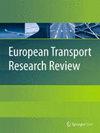多式联运货运障碍分析及其缓解策略
IF 4.2
3区 工程技术
Q1 TRANSPORTATION
引用次数: 0
摘要
多式联运(MFT)已被引入作为一种解决方案,以减少货物运输的外部成本,同时实现成本的改善。尽管MFT有好处,但实际上它的份额很低,卡车运输仍然是最受欢迎的运输方式。最近有一些研究通过讨论MFT的各种障碍来研究这个问题。然而,很少有概念性工作全面考察组织在MFT应用过程中可能面临的障碍。为了解决这一差距,本文回顾了104项研究,并确定了31个障碍和克服它们的可能策略。为了澄清这些障碍的本质,我们开发了一个概念性障碍框架,将识别的障碍定位在整个MFT链中。该框架将壁垒分为6类:MFT终端、MFT网络、管理、法规和补贴、交付特征和互操作性。研究结果为决策者和从业者提供了向MFT过渡障碍的理论和实践见解,并将帮助他们成功实施MFT。本文章由计算机程序翻译,如有差异,请以英文原文为准。
Analysis of the barriers to multimodal freight transport and their mitigation strategies
Multimodal Freight Transport (MFT) has been introduced as a solution for reducing the external costs of freight transport while achieving cost improvements. Despite the MFT benefits, its share has been low in practice, and transport by trucks remains the most preferred transport mode. A few works have recently investigated this issue by discussing various barriers to MFT. However, little conceptual work comprehensively examines the barriers that organizations may face during MFT applications. To address this gap, this paper has reviewed 104 studies and identified 31 barriers and possible strategies for overcoming them. To clarify the nature of these barriers, we developed a conceptual barrier framework that positions the identified barriers within the overall MFT chain. This framework categorizes the barriers into six categories: MFT terminal, MFT network, management, regulations and subsidies, delivery characteristics, and interoperability. The findings provide decision-makers and practitioners with theoretical and practical insights into the barriers to transition toward MFT and will assist them in implementing MFT successfully.
求助全文
通过发布文献求助,成功后即可免费获取论文全文。
去求助
来源期刊

European Transport Research Review
Engineering-Mechanical Engineering
CiteScore
8.60
自引率
4.70%
发文量
49
审稿时长
13 weeks
期刊介绍:
European Transport Research Review (ETRR) is a peer-reviewed open access journal publishing original high-quality scholarly research and developments in areas related to transportation science, technologies, policy and practice. Established in 2008 by the European Conference of Transport Research Institutes (ECTRI), the Journal provides researchers and practitioners around the world with an authoritative forum for the dissemination and critical discussion of new ideas and methodologies that originate in, or are of special interest to, the European transport research community. The journal is unique in its field, as it covers all modes of transport and addresses both the engineering and the social science perspective, offering a truly multidisciplinary platform for researchers, practitioners, engineers and policymakers. ETRR is aimed at a readership including researchers, practitioners in the design and operation of transportation systems, and policymakers at the international, national, regional and local levels.
 求助内容:
求助内容: 应助结果提醒方式:
应助结果提醒方式:


